The Ismailia Riots
" The Lancs & the Tanks go into Action "
Army Mansions" : On of the Ismailia
Note: After reading this chapter please take a moment to read ex Royal Marine James Robinson’s version of the Ismailia Riots
This account is of the battle that took place in Ismailia towards the end of 1951. It was reported in great detail in the "Gallipoli Gazette" of April 1952 (the newsletter of the Lancashire Fusiliers) "This web site is grateful to Captain (Rtd) J. O'Grady, Curator of the Museum of the Lancashire Fusiliers, for his permission to reprint this article in its entirety.
When the Egyptian Government abrogated their treaty with Great Britain on the 15th October 1951, the 1st Bn.
The Lancashire Fusiliers was warned to be ready for internal security duties in Ismailia on the following day. "A" Company was placed on one-hour notice to move, while the remainder of the Battalion was held at four hours notice.
Since no measures were allowed to be taken that would give the Egyptians any cause for complaint, it was not possible to send troops into town, as a precautionary measure, to be immediately available in case of trouble.
The Battalion was therefore held in readiness in its barracks at Moascar, some two miles from the British residential area of Ismailia.
At about 8.15 am on the 16th October, a party of Egyptians arrived from Cairo and started anti-British demonstrations in the square outside the railway station. A large crowd soon collected and was whipped up into an excited frenzy.
The mob started by overturning British cars and trucks, looting their contents and setting them on fire.
The civil police made a few half-hearted attempts to disperse them and there was a comparative lull at about 8.45 a.m. British service families, who were in the town in the normal way, took the opportunity to return to their homes but some thirty women and children took refuge in the N.A.A.F.I grocery store in Station Square
.
At about 9.15 am the ringleaders led a large crowd to the N.A.A.F.I, set fire to the fence, forced an entry and started looting.
The N.A.A.F.I staff and service families were driven into the back premises. At the same time, large crowds were wandering about and shouting in different parts of the town.
The situation was completely out of control, the police making little effort to restore order. The Commander 3rd Infantry Brigade, therefore ordered "A" Company of The Lancashire Fusiliers into the town.
The Commanding Officer issued instructions for "A" Company to establish itself in French Square and to rescue the British people cut off in the N.A.A.F.I
"A" Company immediately proceeded to French Square in three-ton lorries. The square was full of rioters, who were crowding around buses, army vehicles and private cars, which they had set on fire.
There were a number of Egyptian police in the square but they were not taking any effective action to disperse the rioters. As soon as the crowd saw the troops arrive they dispersed rapidly in the direction of the station and without any further action being taken the square was cleared. Major T.P. Shaw debussed his company, less one platoon, and put them on the ground in French Square with a Bren gun covering all roads leading into it.
At the same time he ordered 2 Platoon to proceed without delay to the N.A.A.F.I with the two empty three-ton lorries in order to rescue the trapped families and bring them back to safety, and on completion of this task to rejoin the company.
There was a large mob in the square outside the N.A.A.F.I, who were by this time completely out of control.
They were looting, overturning and firing vehicles, and throwing stones and bottles at any Europeans who showed themselves.
The crowd outside the N.A.A.F.I scattered as the vehicles drove up and they pelted them with stones and bottles. 2nd Lt Inchbald debussed his platoon a few hundred yards from the N.A.A.F.I, left an escort of about five men with the vehicles, and proceeded with the rest of his platoon to the N.A.A.F.I on foot.
Four armed Military Police were in the N.A.A.F.I building protecting the families, but they were hemmed in by the crowds.
The N.A.A.F.I grocery store by this time was swarming with looters and the building was on fire. 2nd Lt Inchbald drove the crowd back from the immediate vicinity of the N.A.A.F.I, and disposed his sections around it.
He then proceeded to escort the families from the buildings to the waiting vehicles.
The crowd closed in again by this time. Many of them were drunk from the whiskey they had looted from the grocery store and the vehicles were again pelted with stones and bottles. 2nd Lt Inchbald then ordered Cpl. Kennedy and the Platoon Sgt. to fire two rounds at the rioters and this drove them back to a safe distance.
The women and children were then put in the vehicles and covered up with tarps and camouflage nets to protect them from flying stones and bottles. Most of the families were put on the centre vehicle with the two halves of the platoon in the rear and leading vehicles. 2nd Lt Inchbald drove the families and the N.A.A.F.I staff to the Blue Kettle Restaurant where there was a Military Police Post and then rejoined the Company in French Square
In the meantime Lt. Col. Bamford arrived in French Square shortly after the Company. He immediately took Major Shaw and a small escort to the N.A.A.F.I to reconnoitre the area. 2 Platoon, with the families, were leaving the N.A.A.F.I just when this party arrived.
There was still a very hostile crowd in the square that seemed to be increasing in numbers. Lt. Col. Bamford ordered the party to fire several shots into the N.A.A.F.I to clear it temporarily of looters and also at the crowd, which at this time were closing in and pelting the party with stones.
As a result of this recce the Commanding Officer ordered Major Shaw to clear the area of the N.A.A.F.I, of the rioters and drive them back along the parallel roads leading into Arab Town. He also ordered "C" Company to proceed to French Square as quickly as possible from barracks.
As soon as "C" Company arrived in French Square, "A" Company moved out to disperse the rioters from the square in front of the station. The Company moved in column of platoons with a party of Sten gunners, together with the platoon commander in front of each platoon. After a few shots had been fired, the crowd rapidly withdrew from the square and crowded into the streets leading into Arab Town.
On the approach of the leading troops, most of the looters in the N.A.A.F.I fled in panic. It was noticeable that amongst them were one or two Egyptian policemen. After the N.A.A.F.I and the square had been cleared the Company paused to reorganize before clearing the streets leading into Arab Town.
At this time a large number of police reinforcements under the command of their own officers arrived in the square but it was evident that they were in sympathy with the rioters and very little could be expected of them. Their own officers, at this stage, were mainly concerned with trying to persuade the various commanders of troops on the spot to exercise the greatest moderation in dealing with the rioters.
They seemed oblivious to the fact that the N.A.A.F.I close to them was looted and burnt, that the square was full of vehicles overturned and gutted by fire, and that a large mob was trying to break into the cellars of Army Mansions, a large block of married quarters near by.
On the arrival of one of "C" Company's platoons at the N.A.A.F.I, "A" Company proceeded to drive the mob down the parallel streets leading from the station square and at right angles to the Rue Telatine, which was the physical boundary of Arab Town.
At this time, the crowds who had been driven from the square were bunched together in large numbers along the streets and were still very hostile. Anti British slogans of the vilest nature were being shouted and stones and bottles were being thrown.
The Company was now split up into columns, each column being in position at the entrance to each particular street. It was hoped that the threat of troops advancing towards the crowd with bayonets fixed would suffice to get them moving back in different directions but this was not so.
Although the crowd at the head of each street started to move back, those behind them who could not see what was happening in front, held their ground. After one or two unsuccessful attempts to move the crowd back in this way, the centre column fired two or three bursts of Sten on the ground at a safe distance from the crowd.
This was immediately taken up by all the columns on the left and right who did likewise.
The noise of these bursts, which opened up almost simultaneously and was accentuated by the echo from the numerous buildings, sounded most effective and the crowd began to move back in haste. After advancing another two hundred yards or so, the columns opened up again and panic set in amongst the rioters as they ran in confusion back across the Rue Telatine into Arab Town.
During this advance communication was temporarily lost between the columns, but the rate of advance was approximately the same and each column knew that Company headquarters was moving at the head of the centre one. On arrival at the Rue Telatine, contact was re-established throughout the Company.
Major Shaw put small parties of men, about half sections, on the ground to cover each of the numerous streets leading off the Rue Telatine. The latter was bounded on one side by the Rue Mohd Ali and the Sweet Water Canal and on the other side by the railway line.
There were a great many of these streets, and as a result so long was the company perimeter that they were of necessity rather thin on the ground and the whole company was committed without the Company Commander being able to keep a reserve on hand to move to any threatened point. No. 31 set communication with Battalion HQ, which by this time was established, in French square, and each platoon had a No. 88 set. On account of the numerous buildings that separated platoon HQ from each other. No. 88 set communication was not satisfactory.
During the clearing of the square and subsequent advance into Arab Town, several casualties had to be inflicted on the more extreme of the rioters. This had a great effect on the remainder, who for the rest of the day showed a healthy respect for the troops.
The troops themselves, many of them young soldiers who had just recently completed their preliminary training and only recently arrived from the United Kingdom, remained very calm in the face of extreme provocation from the crowd who were in a very ugly mood.
There was no indiscriminate firing and when fire was opened it was controlled and the minimum of force was used.
The perimeter along the Rue Telatine was established by 1300 hrs, and the situation seemed to be completely restored.
The large crowds had vanished amongst the many streets and garrets of Arab Town. Tea and a very welcome hot meal were sent up at this time and the C.Q.M.S distributed the food by doing a "milk round" to each street in turn.
In the afternoon crowds began to concentrate along the Rue Telatine at various points.
The main concentration was on the extreme right in front of 2 Platoon's area near the railway line. They were crowding in along the perimeter and gradually increasing in numbers they seemed to be regaining their confidence.
These crowds were difficult to deal with. They were not a vast mob out of control under the influence of mob hysteria as the morning rioters had been. They contained an equal number of extremists and talkative individuals who were urging moderation to the former and curious onlookers.
The extremists were attempting to force their way through the cordon and engage individual sentries in arguments.
The more moderate individuals were arguing with the extremists and trying to engage the troops in reasonable discussion, while behind there was a rapidly increasing number of curious onlookers who might be persuaded either way and who were gradually pushing those in front closer into the perimeter.
Major Shaw visited 2 Platoon area and decided to reinforce this area with troops from quieter parts of the perimeter. 2nd Lt Inchbald made several attempts to drive the crowd away by the threat of troops moving forward with fixed bayonets.
He then ordered a few shots to be fired at the crowd and the latter dispersed rapidly. A similar crowd had concentrated close to 1 Platoon perimeter and Sgt. Wall was compelled to open fire, after which the crowd dispersed rapidly.
While the crowds were forming, the Egyptian police, moving from east to west along the Rue Telatine in trucks, attempted to disperse the crowds. On two occasions the method used was to drive rapidly up the Rue Telatine and to fire over the heads of the crowd from moving vehicles. These methods were quite ineffective and on two occasions completely innocent individuals, sitting by the road at street cafes, were hit and wounded.
...
. .
.
..........
د. يحي ألشاعر

 آخر 10 مشاركات
آخر 10 مشاركات


























 المواضيع المتشابهه
المواضيع المتشابهه














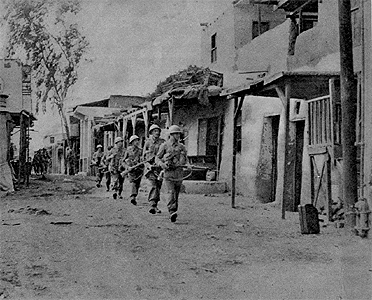
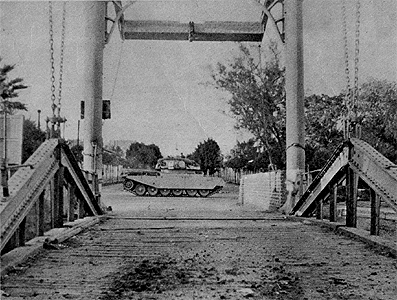
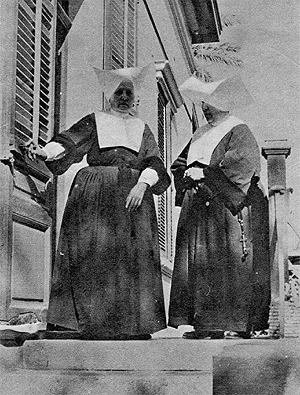
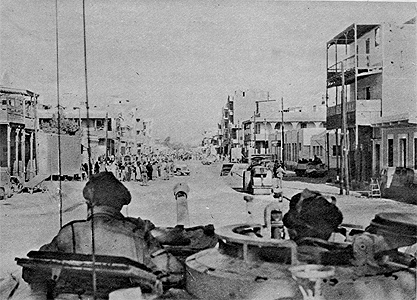
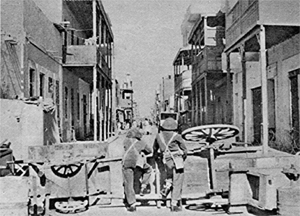
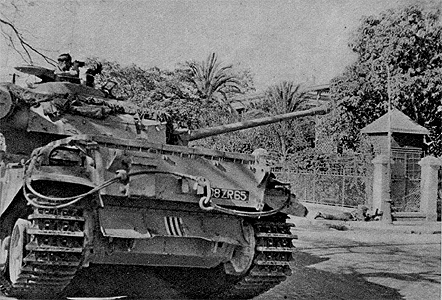
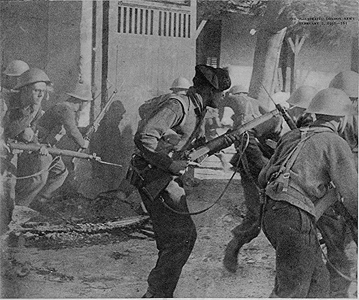
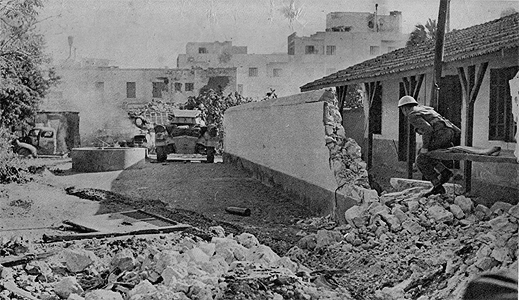



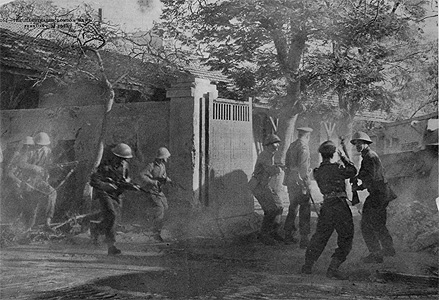
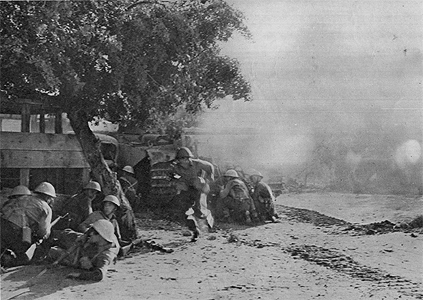
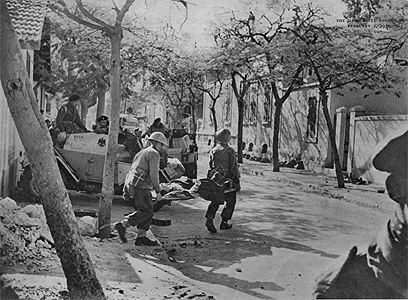
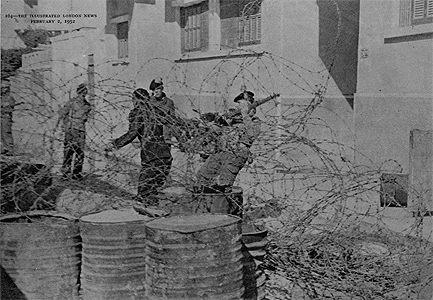
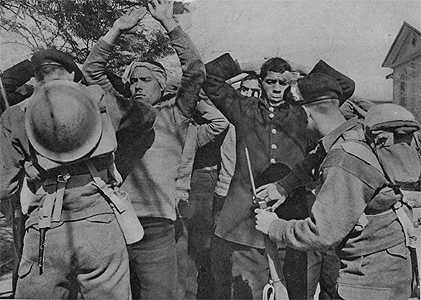
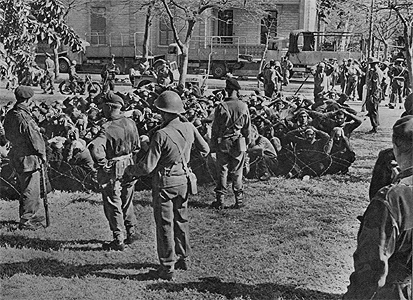
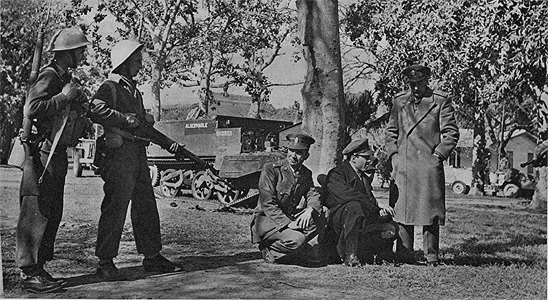
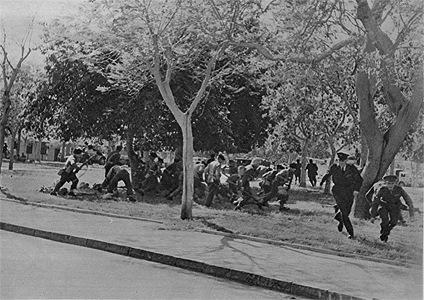

















 العرض العادي
العرض العادي


